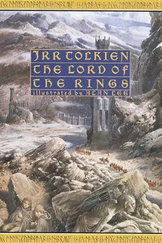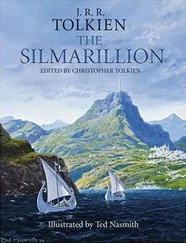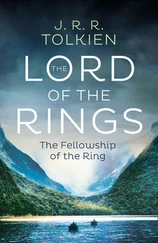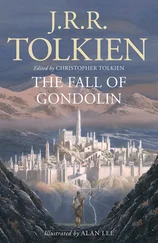J Tolkien - The Silmarillon
Здесь есть возможность читать онлайн «J Tolkien - The Silmarillon» весь текст электронной книги совершенно бесплатно (целиком полную версию без сокращений). В некоторых случаях можно слушать аудио, скачать через торрент в формате fb2 и присутствует краткое содержание. Год выпуска: 1985, ISBN: 1985, Издательство: Del Rey, Жанр: Эпическая фантастика, на английском языке. Описание произведения, (предисловие) а так же отзывы посетителей доступны на портале библиотеки ЛибКат.
- Название:The Silmarillon
- Автор:
- Издательство:Del Rey
- Жанр:
- Год:1985
- ISBN:0345325818
- Рейтинг книги:5 / 5. Голосов: 1
-
Избранное:Добавить в избранное
- Отзывы:
-
Ваша оценка:
- 100
- 1
- 2
- 3
- 4
- 5
The Silmarillon: краткое содержание, описание и аннотация
Предлагаем к чтению аннотацию, описание, краткое содержание или предисловие (зависит от того, что написал сам автор книги «The Silmarillon»). Если вы не нашли необходимую информацию о книге — напишите в комментариях, мы постараемся отыскать её.
Those interested in J.R.R. Tolkien's Middle Earth should not be without this grand volume that tells the tragic tale of the struggle for control of the Silmarils, a struggle that would determine the history of the world long before the War of the Ring.
The Silmarillon — читать онлайн бесплатно полную книгу (весь текст) целиком
Ниже представлен текст книги, разбитый по страницам. Система сохранения места последней прочитанной страницы, позволяет с удобством читать онлайн бесплатно книгу «The Silmarillon», без необходимости каждый раз заново искать на чём Вы остановились. Поставьте закладку, и сможете в любой момент перейти на страницу, на которой закончили чтение.
Интервал:
Закладка:
Varda 'The Exalted', 'The Lofty'; also called the Lady of the Stars. Greatest of the Valier, the spouse of Manwe, dwelling with him on Taniquetil. Other names of Varda, as maker of the Stars, were Elbereth, Elentari, Tintalle. See especially 18-9, 18-9, 23-4, 29, 32, 34-6, 47-8, 54, 62, 73, 83-4, 86, 93, 113-6, 211, 313-6 Vasa 'The Consumer', a name of the Sun among the Noldor. 114 Vilya One of the Three Rings of the Elves, the Ring of Air, borne by Gil-galad and afterwards by Elrond; also called The Ring of Sapphire. 357, 370 Vingilot (In full Quenya form Vingilote). 'Foam-flower', the name of Earendil's ship; see Rothinzil. 305, 310,
312, 319
Vinyamar The house of Turgon in Nevrast under Mount Taras. The meaning is probably 'New Dwelling'. 135,
Voronwe 'The Steadfast', Elf of Gondolin, the only mariner to survive from the seven ships sent into the West after the Nirnaeth Arnoediad; met with Tuor at Vinyamar and guided him to Gondolin. 240, 295 Westernesse See Anadune, Numenor.
White Council The Council of the Wise in the Third Age formed to oppose Sauron. 373-5 White Mountain See Taniquetil. - 158 - White Tree See Telperion, Galathilion, Nimhth (1). The White Trees of Minas Ithil and Minas Anor: 337, 342,
Wildman of the Woods Name adopted by Turin when he first came among the Men of Brethil. 265 Wilwarin Name of a constellation. The word meant 'butterfly' in Quenya, and the constellation was perhaps Cassiopeia. 48 Wizards See Istari. 372 Woodland Elves See Silvan Elves.
Yavanna 'Giver of fruits'; one of the Valier, numbered among the Aratar; the spouse of Aule; called also Kementari See especially 20-1. 18, 20-3, 29-30, 33-5, 43-7, 57, 62, 82, 86-8, 90, 103, 113-4, 120, 321, 324, 362 Year of Lamentation The year of the Nirnaeth Arnoediad. 151, 243
APPENDIX
Elements in Quenya and Sindarin Names These notes have been compiled for those who take an interest in the Eldarin languages, and The Lord of the Rings is extensively drawn upon for illustration. They are necessarily very compressed, giving an air of certainty and finality that is not altogether justified; and they are very selective, this depending both on considerations of length and the limitations of the editor's knowledge. The headings are not arranged systematically by roots or in Quenya or Sindarin forms, but somewhat arbitrarily, the aim being to make the component elements of names as readily identifiable as possible. adan (plural Edain) in Adanedhel, Aradan, Dunedain. For its meaning and history see Atani in the Index. aelin 'lake, pool' in Aelin-uial; cf. lin (2). aglar 'glory, brilliance' in Dagor Aglareb, Aglarond. The form m Quenya, alkar, has transposition of the consonants: to Sindarin aglareb corresponds Alkarinque. The root is kal-'shine', q.v. aina 'holy' in Ainur, Ainulindale. alda 'tree' (Quenya) in Aldaron, Aldudenie, Malinalda, corresponding to Sindarin galadh (seen in Caras Galadon and the Galadrim of Lothlorien). alqua 'swan' (Sindarin alph) in Alqualonde; from a root alak-'rushing' occurring also in Ancalagon. amarth 'doom' in Amon Amarth, Cabed Naeramarth, Umarth, and in the Sindarin form of Turin's name 'Master of Doom', Turamarth. The Quenya form of the word appears in Turambar. amon 'hill', a Sindarin word occurring as the first element of many names; plural emyn in Emyn Beraid. 445 anca 'jaws' in Ancalagon (for the second element in this name see alqua). an(d) 'long' in Andram, Anduin; also in Anfalas ('Lang-strand') in Gondor, Cair Andros ('ship of long-foam') an island in Anduin, and Angerthas 'long rune-rows'. andune 'sunset, west' in Andunie, to which corresponds in Sindarin annun, cf. Annuminas, and Henneth Annun 'window of the sunset' in Ithilien. The ancient root of these words, ndu, meaning 'down, from on high', appears also in Quenya numen 'the way of the sunset, west' and in Sindarin dun 'west', cf. Dunedain, Adunaic adun in Adunakhor, Anadune was a loan from Eldarin speech. anga 'iron', Sindarin ang, in Angainor, Angband, Anghabar, Anglachel, Angrist, Angrod, Anguirel, Gurthang; angren 'of iron' in Angrenost, plural engrin in Ered Engrin. anna 'gift' in Annatar, Melian, Yavanna; the same stem m Andor 'Land of Gift'. annon 'great door or gate', plural ennyn, in Annon-in-Gelydh; cf. Morannon the 'Black Gate' of Mordor and Sirannon the 'Gate-stream' of Moria. ar-'beside, outside' (whence Quenya ar 'and', Sindarin a), probably in Araman 'outside Aman'; cf. also (Nirnaeth) Arnoediad '(Tears) without reckoning'. ar(a)-'high, noble, royal' appears in a great many names, as Aradan, Aredhel, Argonath, Arnor, etc.; extended stem arat- appearing in Aratar, and in arato 'champion, eminent man', e.g. Angrod from Angarato and Finrod from Findarato; also aran 'king' in Aranruth. Ereinion 'scion of kings' (name of Gil-galad) has the plural of aran; cf. Fornost Erain 'Norbury of the Kings' in Arnor. The prefix Ar- of the Adunaic names of the Kings of Numenor was derived from this. arien (the Maia of the Sun) is derived from a root as-seen also in Quenya are 'sunlight'. atar 'father' in Atanatari (see Atani in Index), Iluvatar. band 'prison, duress' m Angband; from original mbando, of which the Quenya form appears in Mandos (Sindarin Angband=Quenya Angamando). bar 'dwelling' in Bar-en-Danwedh. The ancient word mbar (Quenya mar, Sindarin bar) meant the 'home' both of persons and of peoples, and thus appears in many place-names, as Brithombar, Dimbar (the first element of which means 'sad, gloomy'), Eldamar, Val(i)mar, Vinyamar, Mar-nu-Falmar. Mardil, name of the first of the Ruling Stewards of Gondor, means 'devoted to the house' (i.e. of the Kings). barad 'tower' in Barad-dur, Barad Either Barad Nimras; the plural in Emyn Beraid. beleg 'mighty' in Beleg, Belegaer, Belegost, Laer Cu Beleg. brago 'sudden' in Dagor Bragollach. brethil probably means 'silver birch'; cf. Nimbrethil the birchwoods in Arvernien, and Fimbrethil, one of the Entwives. brith 'gravel' m Brithiach, Brithombar, Brithon. (For many names beginning with C see entries under K)
159
– 160 - calen (galen) the usual Sindarin word for 'green', in Ard-galen, Tol Galen, Calenardhon; also in Parth Galen ('Green Sward') beside Anduin and Pinnath Gelin ('Green Ridges') in Gondor. See kal-. cam (from kamba) 'hand', but specifically of the hand held cupped in the attitude of receiving or holding, in Camlost, Erchamion. carak-This root is seen in Quenya carca 'fang', of which the Sindarin form carch occurs in Carcharoth, and also in Carchost ('Fang Fort', one of the Towers of the Teeth at the entrance to Mordor). Cf. Caragdur, Carach Angren ('Iron Jaws', the rampart and dike guarding the entrance to Udun in Mordor), and Helcaraxe. caran 'red', Quenya carne, in Caranthir, Carnil, Orocarni; also in Caradhras, from caran-rass, the 'Redhorn' in the Misty Mountains, and Carnimirie 'red-jewelled', the rowan-tree m Treebeard's song. The translation of Carcharoth in the text as 'Red Maw' must depend on association with this word; see carak-. celeb 'silver' (Quenya telep, telpe, as in Telperion) in Celeborn, Celebrant, Celebros. Celebrimbor means 'silver-fist', from the adjective celebrin 'silver' (meaning not 'made of silver' but 'like silver, in hue or worth') and paur (Quenya quare) 'fist' often used to mean 'hand'; the Quenya form of the name was Telperinquar. Celebrindal has celebrin and tal, dal 'foot'. coron 'mound' in Corollaire (also called Coron Oiolaire, which latter word appears to mean 'Ever-summer', cf. Oiolosse); cf. Cerin Amroth, the great mound in Lothlorien. cu 'bow' in Cuthalion, Dor Cuarthol, Laer Cu Beleg. cuivie 'awakening' in Cuivienen (Sindarin Nen Echui). Other derivatives of the same root are Dor Firn-i-Guinar; coire, the first beginning of Spring, Sindarin echuir. The Lord of the Rings Appendix D; and coimas 'life-bread', Quenya name of lembas. cul-'golden-red' in Culurien. curu 'skill' in Curuftn(we), Curunir. dae 'shadow' in Dor Daedeloth, and perhaps m Daeron. dagor 'battle'; the root is ndak-, cf. Haudh-en-Ndengin. Another derivative is Dagnir (Dagnir Glaurunga 'Glaurung's Bane'). del 'horror* in Delduwath; deloth 'abhorrence' in Dor Daedeloth. din 'silent' in Dor Dinen; cf. Rath Dinen, the Silent Street in Minas Tirith, and Amon Din, one of the beacon-hills of Gondor. dol 'head' in Lorindol; often applied to hills and mountains, as in Dol Guldur, Dolmed, Mindolluin (also Nardol, one of the beacon-hills of Gondor, and Fanuidhol, one of the Mountains of Moria). dor 'land' (i.e. dry land as opposed to sea) was derived from ndor; it occurs in many Sindarin names, as Doriath, Dorthonion, Eriador, Gondor, Mordor, etc. In Quenya the stem was blended and confused with a quite distinct word nore meaning 'people'; in origin Valinore was strictly 'the people of the Valar', but Valandor 'the land of the Valar', and similarly Numen(n)ore 'people of the West', but Numendor 'land of the West'. Quenya Endor 'Middle-earth' was from ened 'middle' and ndor; this in Sindarin became Ennor (cf. ennorath 'middle lands' in the chant A Elbereth Gilthoniel). draug 'wolf' in Draugluin. du 'night, dimness' in Delduwath, Ephel Duath. Derived from earlier dome, whence Quenya lome; thus Sindarin dulin 'nightingale' corresponds to lomelinde. duin '(long) river' in Anduin, Baranduin, Esgalduin, Malduin, Taur-im-Duinath. dur 'dark' in Barad-dur, Caragdur, Dol Guldur; also in Durthang (a castle in Mordor). ear 'sea' (Quenya) in Earendil, Earrame, and many other names. The Sindarin word gaer (in Belegaer) is apparently derived from the same original stem. echor in Echoriath 'Encircling Mountains' and Orfalch Echor; cf. Rammas Echor 'the great wall of the outer circle' about the Pelennor Fields at Minas Tirith. edhel 'elf (Sindarin) in Adanedhel, Aredhel, Gloredhel, Ost-in-Edhil; also in Peredhil 'Half-elven'. eithel 'well' m Eithel Ivrin, Eithel Sirion, Barad Eithel; also in Mitheithel, the river Hoarwell in Eriador (named from its source). See kel-. el, elen 'star'. According to Elvish legend, ele was a primitive exclamation 'behold!' made by the Elves when they first saw the stars. From this origin derived the ancient words el and elen, meaning 'star', and the adjectives elda and elena, meaning 'of the stars'. These elements appear in a great many names. For the later use of the name Eldar see the Index. The Sindarin equivalent of Elda was Edhel (plural Edhil), q.v.; 'but the strictly corresponding form was Eledh, which occurs in Eledhwen. er 'one, alone', in Amon Ereb (cf, Erebor, the Lonely Mountain), Erchamion, Eressea, Eru. ereg 'thorn, holly' in Eregion, Region. esgal 'screen, hiding' in Esgalduin. - 161 - falas 'shore, line of surf' (Quenya falasse) in Falas, Belfalas; also Anfalas in Gondor. Cf. Falathar, Falathrim. Another derivative from the root was Quenya falma '(crested) wave', whence Falmari, Mar-nu-Falmar. faroth is derived from a root meaning 'hunt, pursue'; in the Lay of Leithian the Taur-en-Faroth above Nargothrond are called 'the Hills of the Hunters'. gaer sea' in Belegaer (and in Gaerys, Sindarin name of Osse). Said to derive from the stem gayaawe, faugfea finformen fuin 'gape' in Anfauglir, Anfauglith, Dor-nu-Fauglith.
Читать дальшеИнтервал:
Закладка:
Похожие книги на «The Silmarillon»
Представляем Вашему вниманию похожие книги на «The Silmarillon» списком для выбора. Мы отобрали схожую по названию и смыслу литературу в надежде предоставить читателям больше вариантов отыскать новые, интересные, ещё непрочитанные произведения.
Обсуждение, отзывы о книге «The Silmarillon» и просто собственные мнения читателей. Оставьте ваши комментарии, напишите, что Вы думаете о произведении, его смысле или главных героях. Укажите что конкретно понравилось, а что нет, и почему Вы так считаете.












